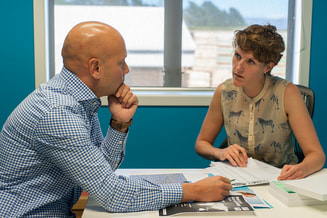|
,Let's face it. Not all Private Investigators are the best organized when it comes to "paperwork" (we are referring to both digital case file information and real paper). So what do you do???? Here's some advice, not necessarily new advice mind you, from one of the most disorganized private investigators we know. (She asked that we withhold her name - so we named her "Messy").
Private I HQ: "How do you stay organized since we're told you're disorganized?" Investigator "Messy": "For paperwork I use pocket file folders. One for each case I'm actively working. I simply take all paperwork, like my receipts, copies of evidence, all of it, and put them in the folder. Now it's all in one place. I throw a couple of blank sheets of paper in there for my notes, expense and time logs." Private I HQ: "OK, Investigator "Messy", what do you do about electronic files?" Investigator "Messy": "The same thing. I make a file on my computer desktop with the case number as the name. When I receive an email in reference to a case I save it to a PDF file and then drag and drop in the case file folder on my desktop. Digital files, like surveillance video, or statements, I do the same thing. By the way, a neat thing you can do, I guess depending on your computer, you can right click and print and everything in the folder, except the videos of course. I can then add those to my pocket file folders when I'm on the road." Private I HQ: "That sounds pretty organized. Why do you feel you are disorganized?" Investigator "Messy": "My friends remember how it was for me before I set-up this system. My desk was always piled high with papers. I mean really piled up. You couldn't see the top of my desk." [She places her hand about a foot above the table showing the height:-)] "I felt like I could find everything, and I could. It just took me a long time. Now I simply grab the case file folder, or open it on my desktop and look for what I need. The key is to put anything in the folders as soon as possible. Immediately! I know other investigators that do the exact same thing. So, it's not my idea, just an idea that I put in to motion because of the ribbing I took from friends and family." Private I HQ: "Why not an electronic case file system?" Investigator "Messy": "Cost and it's just me. Also, I tailor my completed reports for what the client needs. Sometimes that's hard to do with an electronic file system. And, for me, having an electronic report writing system requires me to be tied to a desk. I'm on the go a lot and often work away from the office. I'm sure there's an online solution out there, but again, it's a cost issue. A cost that would ultimately have to pass on to my clients." Sometimes, the tried-and-true, simple method is the best.
0 Comments
 Mirror body language such as leaning forward if they are. Mirror body language such as leaning forward if they are. Conducting interviews is critical to any investigation. Private investigators use information gained from interviews to identify suspects, verify facts, or find leads to successfully conclude an investigation. Since interviews are so critical it makes sense for a private investigator to invest a few minutes to build rapport to increase the information they will receive. Building rapport is not an art, it only takes a few minutes and when you focus on building rapport with someone you are interviewing you will receive more information than you would have without. Steps to building rapport: 1. Don't rush in to the interview - Take a few minutes to talk with the person. Find topics of common interest. "How do you like working here?", "Did the weather cause problems commuting to work today?" This allows the person to become at ease with you, and for you to feel more at ease with them. Often a few minutes of talking about topics other than the purpose of the interview will help overcome resistance. 2. Mirror the individual using body language - If the person is leaning forward on the table, do the same. If they are sitting relaxed, do the same. Mirroring someone's body language subconsciously puts them at ease with you. Don't be too obvious, just mirror their body language every few minutes. 3. Practice active listening - The point of the interview is to listen. Some investigators have a tendency to interrupt, or cut someone off when they are talking to try and get to the point. Even if the individual rambles when talking with you, allow them time to just talk. It may be a sign they are becoming more at ease. Also, they will be encouraged to talk more when you ask the hard questions. Paraphrase what they say to you make sure you understood them correctly as well as signaling them that you are listening. 4. Be empathetic - Letting them know that you understand how they felt about a situation will further develop trust. "I see that you were angry." "Other people would feel bad if that happened to them." Being empathetic does not mean you agree, rather you are trying to understand their emotional viewpoint. One investigator shared that by being empathetic the individuals would often share more information about an incident, sometimes confessing. 5. Be respectful to the other person - Some people are hard to respect because of their actions, or attitudes. By always being respectful towards them you increase your chances of breaking down their resistance, or increasing the chances they will lower their guard when talking to you. Building rapport will increase the effectiveness of your interviews, and allow you gain more information. Often the information that will be provided will be more accurate than just asking specific questions. Private investigations is a for profit business. Getting the investigation right is critical for private investigative firms to maintain their reputation, and gain additional business. Here are a few tips that seasoned private investigators shared to make sure they get every investigation right!
Getting any investigation right takes a lot of skill, planning, preparation and then proper execution. Private investigators are ethical people. Sure there are those very few that are not. Private investigators are often drawn to the profession because of the ethics they already have since the profession is one that recognizes ethical behavior. So where are ethics derived from for private investigators?
Ethics and moral behaviors above what many would consider the norm are standard for private investigators and their standards are derived from several sources as mentioned above. Private investigators are attracted to the profession because it fits their life style, it is dictated in regulations, laws, and training. And, most importantly, maintaining their ethics is critical to their success.  Private investigations is one of the oldest businesses in the world starting well before the 16th century. US Bureau of Labor Statistics states that the growth of the private investigations industry is around 11% above the average growth rate for all other professions. So why are private investigators in demand? Primarily, they can fill a void where law enforcement do not have the resources, time, or expertise to conduct an investigation.
There are a number of ways that private investigators can assist individuals and companies that are not often thought of:
Any situation where the primary skills of a private investigator can be utilized is worth considering. Private investigators are skilled at interviewing, conducting research, searching court records, locating missing persons or property, gathering the facts, and providing a detailed written report. If you are asking the question then you probably need a private investigator. Here are some things to consider when you think about hiring a private investigator:
Hiring a private investigator will help you get results in most cases. Unfortunately, there are those cases that do not get proven, primarily because there may not be a cause for concern. Private investigators, in most states, are trained to conduct an investigation to get the facts. If you think you might need a private investigator? Then talk with one. I talked with an individual I will not name, that ranted about how private investigators are unprofessional. I had to leave before it got physical. Instead, I share my feelings with this blog, and you bet, I'm sending it to him! Private Investigators that I know are above reproach, truthful, dedicated, and honest.
Let me tell you about private investigators I have had contact with....
Private investigations is a business. A business where only true professionals survive. Being a true professional is being all things honest, true, and ethical, many things that others are not. Thanks for reading and allowing me to vent. Unfortunately, the news often tells stories of private investigators conducting themselves in a unethical, often illegal, manner. As a private investigator you must be ethical in all that you do even if it means turning down an investigation.
Ethical behavior continues to be a problem for private investigators, a relatively small group of private investigators. So how do you avoid becoming embroiled in an ethical dilemma.
Still not convinced!!! If you conduct yourself in an unethical way it will catch-up to you eventually. Consider the short and long term damage it will do to your career, your relationships with those around you, and the inevitable guilt and regret you will endure the remainder of your life. Unfortunately, it doesn't work in real life like it does in the movies. If you conduct yourself in an unethical manner the damage is severe and long term. For those private investigators that ethical in all that you do....THANK YOU!!!!! Here is an excellent, free resource, for private investigators. Case Management 101, by author Paul Purcell, provides information for building a successful case file system. It discusses everything from setting up a case numbering system to agreements and report forms. Click here to view the ebook.
Send Paul a note on his website at http://www.thecasefile.com/contact-us-five/ and let him know you saw his ebook at Private I HeadQuarters.  As a private investigator you interview a lot of people with information about your case. Interviewee’s often include; clients, witnesses, suspects, and others such as; subject matter experts with knowledge germane to the investigation. Following are the “Lucky 7” steps to a successful interview:
Pre-planning your interview by following these simple steps will help you get the most out of any interview you conduct. (Below is a sample interview you can download)
|
PI HQPI HQ is dedicated to bringing you important information that impacts the private investigations world. Archives
July 2019
Categories
All
|
||||||
|
Information of interest to professional private investigators.
|
Site created and maintained by Holmes-Tech LLC
 RSS Feed
RSS Feed